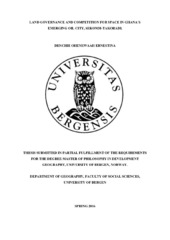| dc.description.abstract | Expectations have been high in Ghana since the discovery of oil and gas in 2007 in the Jubilee Field, located about 60 kilometers off-shore near Sekondi-Takoradi. Owing to the potential economic growth, the city of Sekondi-Takoradi is experiencing a massive influx of both local and foreign labor migrants and investors, leading to a high demand for land for business activities and housing. However, the increasing land value that rapid urbanization has brought about presents challenges. One of these challenges is the competition for space to accommodate the influx of people seeking land for offices, shops, billboards, warehousing and housing in the metropolis, which can result in conflicts over land rights. Land tenure in Sekondi-Takoradi is characterized by legal pluralism which involves the coexistence of customary and statutory land administration which often leads to multiple ownership of land, land claims, conflicts, frustrations, and competition. This study adopted the political ecology approach together with the concept of discourse, institutions and power to investigate how actors involved in land governance and dispute resolutions seek to resolve the increasing number of land conflicts in the expanding oil city, Sekondi-Takoradi and to study the outcomes for various groups of these land conflict resolution processes. The mixed method approach was used in data production for the study. This study found that land governance and procedures of accessibility are influenced by institutions which have been legitimized over time. It was also revealed that land conflicts are amongst the unpleasant effects of the city’s expansion due to multiple sales of the same piece of land as well as a plurality of interest in land. This study found that in the event of resolving these land conflicts, economic power alone may not be the influential factor, but a combination of state power with informal institutional status. Hence, the individual or groups with a combination of both economic and traditional or state power can win a case of land conflict. The study suggests that power is not all about following formal procedures, but also other informal norms in which actor’s actions are embedded. Thus, land governance and conflict resolution in Sekondi-Takoradi is embedded in both formal and informal practices. | en_US |
